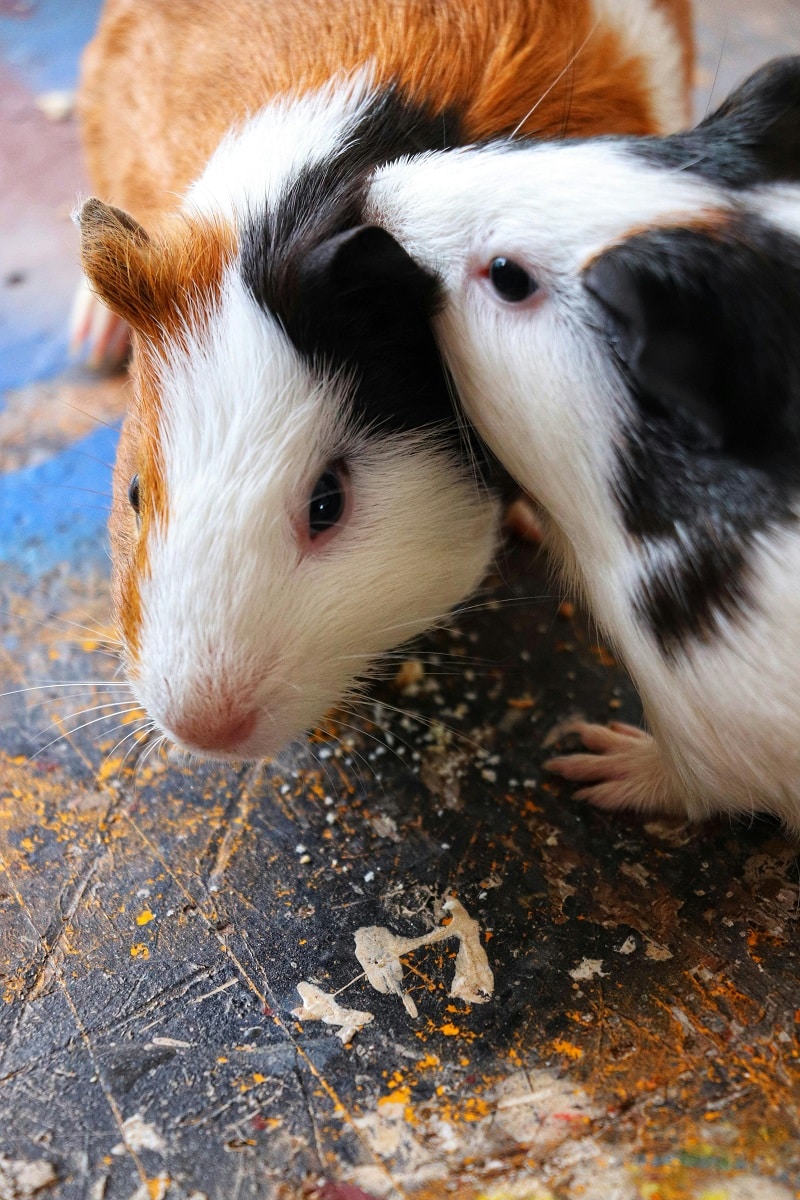Guinea pigs are social creatures that love the presence of their own species, but even among the closest friends, disagreements sometimes happen. Whether you’re introducing new members to your guinea pig herd or managing a group that’s been together for a while, understanding why they might squabble is key to keeping the peace.
If you’re wondering “why are my guinea pigs fighting?!”, Kate’s K9 Pet Care can help. In this guide, we’ll dive into the reasons behind guinea pig fights, how to break them up safely, and what you can do to prevent your piggies from lashing out at each other in the first place.
Fighting or playing?
If your piggies are chasing each other around their pen, it can be difficult to figure out whether they’re fighting or just playing. Younger guinea pigs in particular are highly playful and very social, which means they can act pretty silly together at times. It is possible to tell the difference, though, and you’ll get better at reading their interactions over time.
Chasing, teeth chattering, nudging, or even light nips are not unusual, especially with younger piggies. It helps them form and maintain their strong social bonds and their important social structures without anyone actually getting hurt. However, sometimes things can escalate, and that’s when you need to start paying attention. Playtime is fun, but not if one member of the herd is consistently getting singled out or things progress into actual aggression.
Look out for:
- Persistent chasing
- Lunging with bared teeth
- Actual biting, possibly drawing blood
- Raised hackles
- Loud squealing

Why are my guinea pigs fighting?
So, you’ve assessed that your guinea pigs are definitely fighting rather than playing. Before we go into how to break up a fight to prevent injuries, let’s have a look at what can cause these more serious squabbles. Understanding why they do it is the key to making sure it doesn’t happen again in the future, after all!
Here are the most common reasons squabbles can occur:
1. Dominance
One of the most common reasons for guinea pig fights is the establishment or challenge of the social hierarchy. This behavior is especially common among males, known as boars. In a pair or group setting, guinea pigs naturally work out who is the dominant piggie and who are the subordinates. This process can involve all sorts of unusual behaviors that you might not otherwise see very often.
For example, you may see your males rumble strutting: vibrating and making a low rumbling sound while walking stiff-legged, and mounting. They may also wiggle their bottoms. This is all part of typical dominance displays; usually it doesn’t lead to serious fights, but it can escalate in cases where neither guinea pig backs down.
Guinea pigs are most likely to start challenging each other for dominance when they’re in the adolescent stages of life, between 3 and 12 months of age. They usually mellow out a little when they reach full adulthood, but when they’re young, these encounters can turn aggressive. This especially applies if sudden changes in the environment occur, like if you add a new guinea pig to a multi-pig household. Fights may be triggered as the individuals try to figure out their roles in the newly changed group.
Although it’s very important for piggies to be able to establish and maintain their hierarchy, you should keep a close eye on them if you think there’s an increased risk of fights. This way, you can intervene quickly if things get out of hand. If they frequently do, separating the boars may be necessary.
Did you know? Scientists have found that the wild ancestor of the guinea pig, the cavy, lives in groups of 1 male and 1-2 females. This goes against the old idea that they come in big, mixed social groups. Each mini group lived apart from other groups; if a male approached another male’s females, he’d be chased out. The mini group members were very close and almost exclusively wanted to interact with each other. Of course, our homes aren’t the same as the dense Brazilian savanna in which these wild piggies lived, but it’s always useful to see how our pets would live in the wild!
2. Boredom
Another very common reason for guinea pig fights is sheer boredom. These intelligent rodents can’t be kept in a bare cage and left alone for days at a time: they need toys, mental stimulation, physical exercise, and social interaction. If they don’t receive the enrichment they need, they can turn on their cage mates in order to help release their pent-up energy.
If you suspect your piggies may be fighting out of boredom, ask yourself when you last rearranged the cage layout or introduced a new toy. Do they have puzzle feeders, plenty of wooden toys to gnaw on, tunnels to run through, and hides to retreat into in order to feel safe? If the answer to one or multiple of these is no, you may have found the reason for their conflict.
3. Lack of space
Although pet stores still commonly sell tiny guinea pig cages, these active rodents actually need quite a bit of space. A lack of room can cause fighting, not just because the piggies are cooped up and likely bored, but also because they need to be able to establish their own territories. This is an issue in small enclosures especially if you have multiple guinea pigs, because territorial aggression will be almost impossible to avoid.
The absolute minimum for two guinea pig is 7.5 square feet of space, although in our experience, the bigger the better. This way, they can all carve out their own space and get away from each other if they feel the need to. And be sure to set up multiple each of hides, sleeping spots, and especially feeding stations as well; reducing the potential for competition is very useful in preventing squabbles.
If fights continue despite having a large cage, it may be necessary to consider separate cages. Piggies that are getting bullied regularly can be housed with the most mellow members of the group. If you’ve got two aggressive ones always getting into arguments, you can house each of them with one or two of the rest of the pack. Separating the main culprits is usually enough to restore balance.
4. Pain or illness
It’s never nice when our pets are under the weather, and with guinea pigs, illness or pain can unfortunately actually lead to squabbles. It’s not difficult to imagine: pain can make a normally friendly guinea pig irritable and more prone to lashing out. It may become cranky both with its human family and its rodent family. Common health issues that can lead to pain-induced aggression include dental problems, arthritis, or even a simple injury that hasn’t been noticed.
If your guinea pigs suddenly start fighting and the triggers discussed above don’t seem to fit, it’s time for a thorough health check. Inspect the bad-tempered piggie visually and judge its behavior. Is it eating normally? How does its poop look? Are there changes in behavior, like reluctance to move or unusual noises? If you suspect one of your guinea pigs is unwell, a visit to the vet is crucial to get it back to feeling its best, as well as hopefully stop the fighting.
Breaking up a guinea pig fight
As mentioned, some degree of fighting is normal among guinea pigs. It’s a way for them to establish (or, alternatively, switch up) their pecking order, which is a big part of these highly social rodents’ lives. You should keep a close eye on your furry friends; if you think blood may be drawn or one guinea pig in particular is getting singled out, you’ll have to intervene to prevent injury or stress.
It’s important to act quickly but carefully to avoid injury to yourself and the guinea pigs. Never use your bare hands to separate fighting guinea pigs, as they don’t always care whether they bite their opponent or your fingers. Instead, use a thick towel or wear gloves to protect yourself. You can also use an object like a dustpan or piece of cardboard to gently separate them. Your piggies might be upset about being manhandled, which can affect their trust with you, but luckily it’s easy enough to regain their confidence with tasty treats once things have settled down.
After breaking up the fight, check each guinea pig for injuries. It’s likely a good idea to give them a few hours apart and then carefully reintroduce them to make sure they don’t go right at each other’s throats again. If the fights are frequent and intense, you may want to consider separating the piggies for longer periods or even permanently.

Guinea pigs are highly social creatures, but everyone squabbles with their roommate once in a while!
Conclusion: Why are my guinea pigs fighting?
Understanding why guinea pigs sometimes squabble helps to maintain a peaceful and harmonious herd. Most fights can be traced back to one of four reasons: dominance, boredom, lack of space and resources like food, or underlying health issues. Keeping this in mind makes it easy to prevent the majority of fights in the future:
- Understand guinea pig social structure; for example, housing 2 males and 1 female together is asking for trouble
- Provide plenty of enrichment
- House your piggies in the largest enclosure you can accommodate
- Make sure there’s multiple of all resources available
- Keep an eye on your furry friends’ behavior so you can spot health issues early
- Take your guinea pigs in for vet checks at least yearly
Sources & further reading







